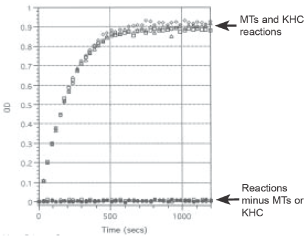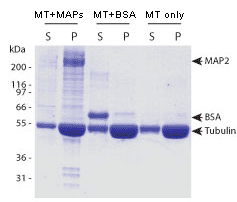Tubulin protein (pre-formed microtubules): porcine brain
Product uses
- Substrate for activation of kinesin ATPases (see Fig. 1)
- Determination of IC50s for kinesin inhibitors
- Used in Cytoskeleton, Inc’s kinesin ELIPA and End point ATPase assays (Cat. # BK060 & BK053)
- Substrate for discovery and characterization of microtubule binding proteins (MAPs) (see Fig. 2)
- Ideal for HTS applications (inquire for bulk rates)
Material
Stabilized microtubules (MTs) are supplied as a lyophilized powder. Microtubules have been prepared from porcine brain tubulin protein that is greater than 99% pure (Cat. # T240). These stringently quality controlled MTs provide highly reliable and reproducible results in assays that require MT substrates. The average MT length in this product is 2 µm. Using these pre-formed microtubules in assays depending on microtubules gives very reproducible results. In a microtubule activated kinesin ATPase assay (see Fig. 1), the CV between samples (Vmax) was less than 5% and the CV of Vmax between assays using different batches of MT001 was less than 8%.
Purity
The tubulin protein used to make pre-formed microtubules is >99% pure. See Cat. # T240.
Biological Activity
MTs serve as a substrate for kinesin motor proteins. Kinesin motor proteins orchestrate a wide range of kinetic events within a cell. They have been shown to move cargoes such as chromosomes and vesicles along MT tracks. Kinesins operate by utilizing the energy of ATP to hydrolysis, an activity that is greatly enhanced in the presence of MTs. An MT activated Enzyme Linked Inorganic Phosphate ATPase (ELIPA™) assay (Cat. # BK060) can therefore be used as a test for the biological activity of MT001 (Fig. 1). The motor protein used in this assay is Kinesin Heavy Chain motor domain (KHC: Cat. # KR01). MT001 is also an excellent substrate for detecting microtubule binding proteins, see Fig. 2.

Figure 1. MT activated kinesin ATPase reaction. Reactions were performed using the kinesin ELIPA assay Biochem™ kit (Cat. # BK060). Reactions contained either MTs or KHC (Cat. # KR01) alone ("Reactions minus MTs or KHC") or the combination of MTs and KHC ("MTs and KHC reactions") . Triplicate reactions were measured in a spectrophotometer at 360 nm. Readings were taken once every 30 s for a total reaction time of 20 min.

Figure 2. Microtubule (MT) binding protein spin-down assay using MT002. >80% of MT002 (arrow: Tubulin) is in pellet (P) after spin-down. MAPs (Cat. # MAPF) bind to MTs and end up in pellet while BSA does not and stays in supernatant (S).
For product Datasheets and MSDSs please click on the PDF links below. For additional information, click on the FAQs tab above or contact our Technical Support department at tservice@cytoskeleton.com
Question 1: If the pre-formed microtubules are resuspended, aliquoted and snap-frozen as directed, will they depolymerize and need to be re-polymerized or is the polymerized state maintained during one freeze and thaw cycle?
Answer 1: The pre-formed microtubules (Cat. # MT002) will not depolymerize upon one freeze thaw cycle. Thaw rapidly in a room temperature water bath and then keep at room temperature until ready to use. However, when aliquoting for snap-freezing, pipette smaller volumes (10-20 ul) since the concentration of the microtubules will be 1 mg/ml (based on datasheet instructions).
Question 2: What is the difference between the two different versions of pre-formed microtubules (Cat. # MT001 and MT002)?
Answer 2: The only difference between the MT001 pre-formed microtubules and the MT002 pre-formed microtubules is the source of the tubulin used to product the microtubules. MT001 uses bovine brain and MT002 uses porcine brain. In side-by-side comparisons (please see the MT002 datasheet), the microtubule-activated kinesn ATPase activity (Cat. # BK053) of MT001 (bovine) and MT002 (porcine) microtubules was compared. Both sources of microtubules produced the same results with this kinesin ATPase end-point assay (Cat. # BK053).
Question 3: How does porcine tubulin compare to bovine tubulin?
Answer 3: Click here for an in-depth comparison of porcine and bovine tubulin.
If you have any questions concerning this product, please contact our Technical Service department at tservice@cytoskeleton.com.




